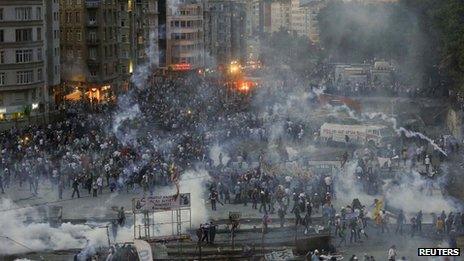Turkey protests: Dangerous waters with no sign of compromise
- Published

It began just after dawn on Tuesday: the thud of tear gas fired across Taksim Square in the biggest police operation here for over a week.
Arcs of water cannon were spewed towards protesters, some of whom responded with petrol bombs and bricks.
For 12 days, the central square in Turkey's biggest city had been under the authority of a growing protest movement. This was the moment that the government decided to retake it.
All through the day, the game of cat and mouse continued.
Once the police retreated, the protesters regrouped. They took refuge in the adjoining Gezi Park, where the unrest was first sparked in response to government plans to redevelop it.
I watched as telecoms trucks were set ablaze, black smoke fusing with the white plumes of tear gas into an acrid mix.
Not listening
What began as a demonstration by environmentalists has mushroomed into something far bigger: a fight by disparate groups for greater freedom in Turkey and a preservation of the country's secular order.
A protester in Taksim Square tells the BBC's Mark Lowen how tear gas felt like "a panic attack"
They see a government with an authoritarian, neo-Islamist agenda: the highest number of journalists in the world in prison, restrictions on alcohol sales, massive construction projects prioritised over human rights.
"This is not an Arab spring", one protester, Melis Behlil, told me.
"We have free elections here. But the problem is that the person elected doesn't listen to us."
She told me she had been in Gezi Park since the morning and that tear gas was thrown inside. "A canister was fired towards the head of my colleague", she said.
"Luckily, he was wearing a hard helmet, which was ripped in half."
And what of the timing? The police clear-out came a day before Prime Minister Recep Tayyip Erdogan was supposed to hold talks with some protesters - a potential chance for dialogue. That prospect now seems in tatters.
Continuing support
But Mr Erdogan has stood firm throughout.
He has called the protesters "vandals" and "terrorists".
On Tuesday he told parliament that the movement was an international conspiracy against Turkey to destabilise its economy.
He lashed out at the foreign press for launching "comprehensive attacks" on the country and warned protesters that they were pawns in a wider game. "We won't show any more tolerance," he said.
Vast swathes of the country still back him. The protest movement has made the headlines - but another side of Turkey exists. Mr Erdogan's support base is conservative and more religious.
They back a prime minister who has won three elections, who has hugely increased Turkey's international prestige, who has opened the country's EU accession talks and launched a peace process with the Kurdish minority.
He has rallied his troops in recent days and plans big marches in Istanbul and Ankara this weekend.
The fear is that as the two sides square off against each other, Turkey's schism will deepen, leading to paralysis.
For now, there is no sign of compromise.
Peaceful majority
"If he wants to come and build on this park", said Mert Ustas, one young protester, "he'll have to put the cement on our heads."
The prime minister has urged demonstrators to voice their discontent at the ballot box in municipal and presidential elections next year.
But he knows the unrest will have to be stemmed long before then - and an attempt at reconciliation launched.
As night fell, the clashes continued here.
But the violent protesters are a minority in an otherwise peaceful social movement.
I have spent days in Taksim and Gezi Park and have met mainly young leftist Turks enjoying a largely festive atmosphere here. The petrol bomb-throwers are the fringe.
Turkey is in deep crisis, unsure of the path ahead. A large section of this population feels alienated from the government and won't be cowed by tear gas.
One of the world's key Muslim democracies is now in dangerous waters.